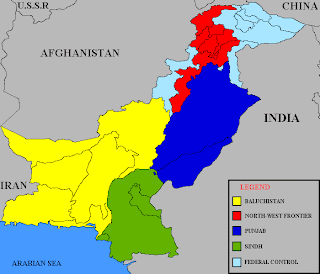Speaking of Pakistan
This Tuesday, at 11:00 AM, I am lecturing on Jinnah and the Muslim League as a part of a South Asia course. 2nd floor, Mathematics Building, Columbia University, if you want to make it.
I am a tad nervous. Not so much because of stage fright, but more so because it's always hard to talk about Jinnah and the idea of Pakistan. Too many people seem to have axes to grind when it comes to this topic. I have none. I care about being sensitive to all sides.
The idea of Pakistan is intrinsically tied to both Pakistani and Indian nationalisms. For the Indian state, the fact of Pakistan's creation was anathema because it gave the lie to its claims to represent both Hindus and Muslims of Hindustan.
Of course to Pakistani nationalists, the idea of Pakistan is deeply meaningful. Pakistan meant to be the homeland for all of South Asia's Muslims. Critics of Pakistan point out that Jinnah's two-nation theory - that Muslims and Hindus were two separate nations - was an outcome of colonial rule and thinking. They criticize Jinnah for adopting it. Other critics have alleged that Pakistan was merely a bargaining table for Jinnah.
They point to facts of post-47 history to validate these claims. Urdu was popular largely among the Mohajirs from India and Punjabis. The Punjabi-Mohajir nexus was set in place as long as Punjabis dominated the army, the most powerful institution in Pakistan by far.
Meanwhile, Balochis, Sindhis, Bengalis and Pathans all demonstrated autonomous tendencies in varying degrees - the most outspoken of them being perhaps the Bengalis and Balochis. Many of these autonomous mo vements were borne of an expression of cultural distinctiveness.
vements were borne of an expression of cultural distinctiveness.
I heard recently that in the Balochi uprising (that Mr. Bhutto suppressed with an iron hand) many of Sheikh Mujib's writings and formulations for East Pakistani autonomy were widely read in Balochistan.
Was Jinnah's Pakistan then a mistake?
There are defenses possible of course to Jinnah's designs.
Jinnah wasn't necessarily the Miltonic self-absorbed nation-maker that many of his critics like to see him as. It was important from him to have a flexible idea of Pakistan because its spatial boundaries were far harder to define, as Indian Muslims were diffused all over. It was important for the idea of Pakistan to develop gradually.
And Jinnah wanted a far more complex Pakistan. First up, he wanted the whole of the Punjab and the whole of Bengal. This would have made a substantial difference.
Think about this. Sikhs and Hindu Punjabis continued to dominate the Indian Army at least for a while, the way Punjabi Muslims dominated the Pak Army. If Pakistan included the whole of Punjab, the Pakistan Army would have been mighty. And religiously diverse.
Religious diversity in the most important state institution of Pakistan would have gone a long way in defining its nationalism.
Secondly, if Pakistan had the whole of Bengal (Jinnah wanted Calcutta), the civil-bureaucr atic administration of new Pakistan would have been far more colorful and complex. Bengali Hindu Bhadraloks, were prominent in the early years of the Congress in the early days of India.
atic administration of new Pakistan would have been far more colorful and complex. Bengali Hindu Bhadraloks, were prominent in the early years of the Congress in the early days of India.
If Pakistan had absorbed these Calcutta-based civil servants, bureaucrats and intellectuals, their presence would have greatly changed the character of Pakistan. We would have had on our hands, a far more composite, pluralistic and diverse Pakistan in the upper echelons of civil-bureaucratic-military administrations.
However, the realities of 1950s and 60s Pakistan were starkly different. The state failed to incorporate the Bengalis of East Pakistan into its fold, neither economically nor politically or culturally, and events of '71, perhaps not in their gruesome form, now appear inevitable to those that look back and reflect.
To my Bangladeshi and Pakistani readers:
The post is not an exercise is pro-Pakistani nostalgia or anti-Pakistani rhetoric, but in reminding ourselves of the complex trajectories of history that are too often levelled into simple narratives.
No comments:
Post a Comment